In the month’s poetry round-up, repetition reigns as poets push at its boundaries through acts of translation and transformation. Katrine Øgaard Jensen throws a translation party full of corruptive play, and the viral “YEET!” echoes through Jason B. Crawford’s collection of the same name. Both Cynthia Cruz (Sweet Repetition) and Samyak Shertok (No Rhododendron) harness repetition with phrase and motif, while Bruce Snider’s Blood Harmony wrestles with the break from brothers as doubles. Kimberly Alidio reflects on the processes of composer Cassandra Miller whose “transcription, automatic singing, and mimicry radically subvert the distance an “original” work performs relative to an “influence,” a distance that defends against being derivative and disperses the loose, asynchronous ensemble in celebration, in refusal of being reduced, divided, and defeated. And isn’t language at this party?” Come join the party, readers. Back to Alidio: “Ear and brain go haywire to make something out of being. Led by imperatives, yet I am one who disturbs. I just think about everyone listening around the same time.”
*
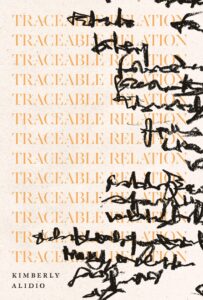
Kimberly Alidio, Traceable Relation (Fonograf Editions)
Yes, “Ear and brain go haywire to make something out of being.” The result: Alidio’s Traceable Relation, in which “each Composition /an interior trick out of a vista into a pocket” can take the form of poem or essay. She foregrounds the ear, whether morphing the sounds of phishing schemes targeting writers for marketing in the poem “Voice Noise” or presenting the overlapping soundtracks of her own life as “a text-to-speech voice (American English, female), along with my mother’s (Filipino English, female)” pray a novena on YouTube while the speaker’s laptop plays “the second hour of a sound art piece featuring a repetitive sequence of recorded speech.”
Layers of voices, shared silences, the sounds of films—“[W]hy don’t poets adapt films into poems rather than autofiction?”—echo the simultaneity of the mind’s wanderings as Alidio slows the pace through reflections on tonality, repetition, the various units of composition: “A sentence takes time to appear in its strange form, as form at all. My father says his pain isn’t due to the cancer, he’s just old, don’t worry. One thing in a field of vision is approached until centered, then named.” Alidio composes a score that weaves grief with inquiries into making amidst interjections of modern life: “Who is to say my father’s afterlife isn’t my life moving in real time with this written text?”
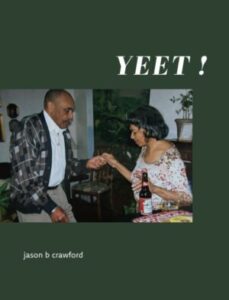
Jason B. Crawford, YEET! (Omnidawn)
Before Tik Tok there was Vine, and the “YEET!” (via “Vine Girl 2014”) reverberating through Crawford’s title series of “essay on YEET!” poems, which are mostly in conversation with other poets, including “on tenderness/ after Camonghne Felix”: I used to write grief into / every poem, but not / today. Instead, I’ll finally think/ of the chrysanthemums, fill the vase / of my chest until I can only exhale / bees and honey,” and “after Hanif Abdurraqib”: “my fingers kiss a slab / of bark and ask only that my children can live / half as long. that must be the point / of all this war, to understand / the durability of trees.” Then there’s “an archival after Douglas Kearney,” which opens, “i • saw • the • bullet • take,” yet while Crawford toggles between occasional visual poetics, his lyricism takes the lead as he works the knot of histories and futures.
In a series of “If I ever leave New York, I am going to burn everything” poems, one opens “mapping my death. Watch america play / cartographer; again, drawing lines across what // I do not own. Watch america play / butcher, slicing red down / my sides, delicate meat of ancestry.” Crawford explores the lines between blood and flower, between histories, inevitabilities, and possibilities. In “Life before the war was beautiful (after Kuzbass Zubrii),” “orchids could fold from the plots in our hands, spin themselves into a gorgeous golden ribbon, wrap the necks of all the neighborhood’s children.”
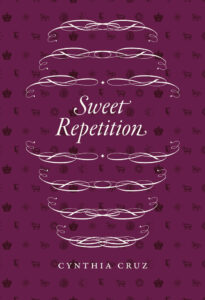
Cynthia Cruz, Sweet Repetition (University of Chicago)
“Even as a child, I already belonged / To death. / A symptom, I am the answer / To my own hopeless question.” If you’ve been reading Cruz’s work, it will come as no surprise that Freud is at the center of her ninth collection of poems, yet here her palette is more dreamlike than cinematic, as she turns to the repetitions of the psyche, to the outward poetic repetition: “Repetition repeats / But also secretes / Something within it, / A substance, The end / Of all things.” Her Hans, based on the child object of Freud’s study, speaks for himself: “I want to be / Devoured / By horses, // To enter the impossible / Kingdom of their secret / Animal silence.” Cruz continues to be a poet who understands the lyric’s profound bridging of the psychological with collective resonances, and this surfaces as she drives us towards this collection’s Brecht-inspired conclusion with the poem “All of Us or None of Us.” She ends with his words—“all of us or none”—but begins this final poem in medias res: “And we made a tunnel / Through the darkening Tunnel. You, me, / And all the others” pushing us through “blackening / Gelatinous junk” as we are “Swimming / In the warning / Of what was once America.”
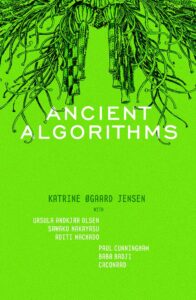
Katrine Øgaard Jensen, Ancient Algorithms (Sarabande)
“Consider This: All writing is translation” and “Consider this: All writing is collaboration—between the author and their influences, the specter of other authors and translators haunting each text.” These statements pulled from Katrine Øgaard Jensen opening “For Your Consideration,” are not, of course, original stances, but she bridges them and brings them to life in the collaborative party she throws here, inviting in Sawako Nakayasu, Aditi Machado, Paul Cunningham, Baba Badji, and CAConrad. And of course Ursula Andkjær Olsen, with whom Jensen, as translator, has joined in “collaborating with…on corrupting her poems.”
The collection generally moves from originals (in Danish) by Olsen to Jensen’s translations/corruptions in English, and then to her back-and-forths with the other collaborators. The “rules” and “processes” of each “experiment,” are sometimes instructions in the vein of Charles Bernstein’s “wreading experiments,” such as simply reversing a poem, and at other times become poetic themselves. Paul Cunningham’s “Rule: Place the poem in the person concerned and repeat the situation” ultimately leads through a few poems to Jensen’s “Rule: Now Use the Poem as a Puppet and Rewrite from the perspective of Rainer Maria Rilke’s Puppeteer Angel in the Fourth Duino Elegy,” the result of which begins, “I angel at the beginning and ending / of the premeditated activities you call life / and yes, there are signs.”
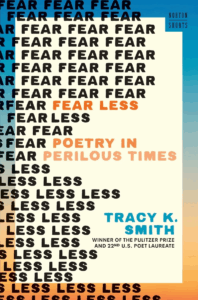
Tracy K. Smith, Fear Less (W.W. Norton & Company)
If you followed The Slowdown podcast when Tracy K. Smith first launched it as U.S. Poet Laureate, and you’ve missed getting to, well, slow down with her and listen to her talk about poems and life, she now returns as guide, this time in book form. This conversational collection of essays is marked by having been written not only at the other end of her era as poet laureate, but in our “current moment…also marked by new heights of anxiety and depression, social division, misinformation, and mistrust.” As Smith leads us, gently, through landmark poems—the opening chapter features Robert Hayden’s “Those Winter Sundays,” Keats’ “To Autumn,” and Joy Harjo’s “She Had Some Horses,” and later guides us through a dozen contemporary poets such as Danez Smith, Harriet Mullen, Frank Bidart, and John Yau, with dips back to Emily Dickinson and Gwendolyn Brooks, she reminds us of the spaces poems can hold for us upon return or discovery. I found it comforting to revisit so many favorite poems with her by my side. (And yes, this is also a good holiday gift with substance.) Smith can get away with returning to the question that most poets hope will die, because her answers are sincere and vital in this moment: “Does poetry matter? Why not ask does imagination matter? How about patience, courage, humility, hope, and awe?”
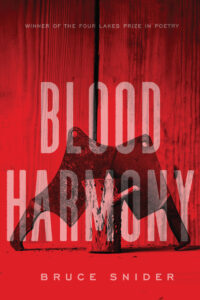
Bruce Snider, Blood Harmony (University of Wisconsin Press)
“In the beginning he was a machine among machines”—this is Blood Harmony’s speaker’s younger brother, before opioids, back when “his body meant standing on the factory floor, / a welding torch in his hands.” The path to his unraveling is one of two bodies, two brothers who we follow from innocuous battles over TV remotes that resolve “He is almost crying. I hold him down, tickle him, he laughs and laughs,” to an awakening from Narcan “for the second time” after which “we held each / other praising God and everything was good until it wasn’t.” We follow the older brother as he wrestles with the ties of blood and name, the repetitions of the assumptions of what it is to be a brother, and a man, building across the collection—“brother means shared pants and brother / means dependency” and “didn’t he wear my face / and wasn’t it my name” and “and I thought: his body is my body”—alongside the evolutions of autonomy—his own coming out, his brother’s dive into addiction and its impact: “He moved the way water moves—oblivious to everything around him.” Snider navigates the complex intersections of addiction with class, sexuality, masculinity, and family bonds with skilled generosity in this powerful fourth collection.
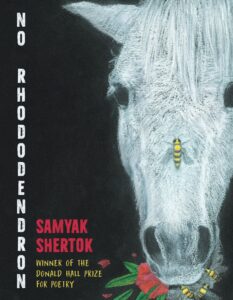
Samyak Shertok, No Rhododendron (Pitt Poetry Series)
“[I]n the dark I learned to hold / bees in my throat, one / for every ancestor. Let it be said / not a single bee died.” In Nepali poet Samyak Shertok’s debut collection, “haunting” is both ancestral and formal—words repeated from the first line, and a sonnet sequence “A Sky Burial” is embedded in the middle of a collection of such formal play as mashups of haibun and ghazal or ghazal, villanelle, and sonnet. Yet amidst this external focus on varied lyric forms, the drive in this collection feels narrative, the stories history doubling and echoing myth and history. “No Rhododendron” begins, “They came unarmed. They came / half-masked.” In “How to Sky-bury Your Fatherland: A Ghazanellet,” “Farther he flies, cleaner he hears the seed-music. Not every falling // Boy is a myth. Some gods live just to feed boys to the sea.” Even the sonnet sequence circles around story itself: “tell me a story, Apa. I’m here, beside you all night. / Show me how not to write the last line. / a river into the stone navel that can never fill up the hole.”
